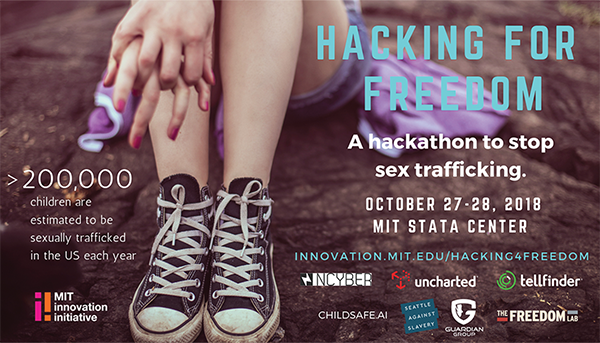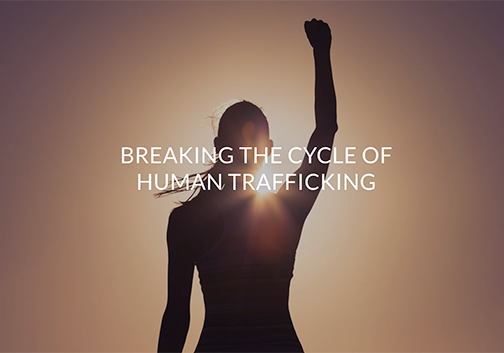At The Freedom Lab, one of our three tenets in driving innovation in counter-human trafficking is to serve as a fusion cell to synchronize counter trafficking activities in different sectors. By acting as a node in the network, we aim to support information sharing and drive collaboration. One venue in which we pursue this goal is by hosting hackathons.
A mentor of mine often speaks of the power of weak ties in driving innovation and tackling grand challenges. Weak ties, one of three interpersonal ties defined in mathematical sociology and first shown as crucial parts of social networks by American sociologist Mark Granovetter.1
Theorized to be responsible for the majority of social network structure, weak ties are also responsible for the transmission of information across these networks. Specifically, we receive much more novel information through our weak ties than we do from our strong ties.
In my role at The Freedom Lab, I am constantly working to leverage these weak ties to advance our mission in counter-human trafficking. And for me, there is no better example of this than our upcoming hackathon. Much of the magic that is a hackathon comes with rapid use of existing weak ties and the acceleration expanded social network structures. Simply put, it is a concentrated form of information sharing which drives creativity. A forum that demands a passion for solutions and big problems.
The Challenge
As I sit and write this post, the International Labour Organization estimates that upwards of 21 million children, women and men are currently slaves around the globe. At an estimated $150 billion global industry, human trafficking is estimated to be the third largest and fastest growing illicit market globally and a global human rights crisis.2
Commercial sexual exploitation, or sex trafficking, makes up two thirds, or $99 billion of the global industry.2 We all too often think of human trafficking or “modern slavery” as a horrific crime taking place outside our borders. However, with over 1,000 US children still being arrested for “prostitution” each year and over 80% of identified sex trafficking victims in the US being US citizens,3 there is no doubt this is a local problem. We know that the exploitation and sale of humans for sex is prevalent across humanity. This is happening today, in your town.
In sex trafficking markets, we know technology has facilitated the rapid growth of the industry. In the same fashion that the internet has allowed for a thriving online commercial marketplace of goods and services, it has also allowed for the increased advertising and sale of humans for sex. Pressure to address the growing commercial sex trafficking online markets has incited debate and policy reform the responsibility and rights of online platforms.4 As technology has supported the growth of the commercial sex markets and the exploitation of the vulnerable, there has been a growing mandate to repurpose our technological innovations to fight against such crimes. However, due to inherently hidden nature of these activities, measuring and tracking human trafficking market activity presents complex challenges and requires creative cross-disciplinary solutions.
Hacking for Freedom

For the hackathon, we have been able to bring together a network of counter-human trafficking experts from across a number of nonprofits, law enforcement, and industry to partner in supporting a group of like-minded people to tackle this grand challenge.
Lack of accurate data and analytics is a major obstacle in assessing impact of policy, law enforcement initiatives and survivor services. Technical solutions have the potential to be extraordinarily powerful given the increasingly extensive use of technology in this pattern of offending. However, the technical challenges are not trivial. At the same time, some of these groups are very low tech, which enables them to operate well below the radar. Challenges exist across nature, scope, prevalence and complexity. Different people — victims, facilitators and consumers — are involved in trafficking for different reasons and in very different ways. With high levels of complexity, all these factors must be considered in addressing this challenge.
It is Only Human
Humans, by no means, are new to exploitation. We have a very lengthy track record of horrific abuses of our fellow humans in the name of profits and gains. Likewise, we are not new to fighting for our freedoms and defending the vulnerable and exploited. Along this theme of repeated behavior, we are not the first group to hold a hackathon on counter-sex trafficking.
At its root a hackathon is about getting a group of like-minded people together to experiment, share, and maybe build something amazing through collaboration and knowledge sharing. It is an effort of passion and a craft. From Yahoo’s first hack-day to the recent Vatican Hack, the creative value of hackathons is undeniable. Hackathons are imbedded into the culture of problem solving at MIT. I cannot think of a better platform to search for solutions to some of humanities greatest challenges with some of the brightest young minds.
Mirar Bristol is co-founder of The Freedom Lab, a laboratory for developing and testing innovative system-based counter human trafficking research, methods, cyber technologies, intelligence collection, and world altering ideas.
Hacking for Freedom: A hackathon to stop sex trafficking takes place on Oct. 27–28, 2018 at the MIT Stata Center. Learn more and register here.
References:
- Granovetter, M.S. (1973). “The Strength of Weak Ties” (PDF). Am. J. Sociol. 78 (6): 1360–80. JSTOR 2776392 link
- International Labour Organization. “ILO says forced labour generates annual profits of US$ 150 billion” link
- Rights $ Girls. “Issue Areas” link
- H.R.1865 – Allow States and Victims to Fight Online Sex Trafficking Act of 2017 link

